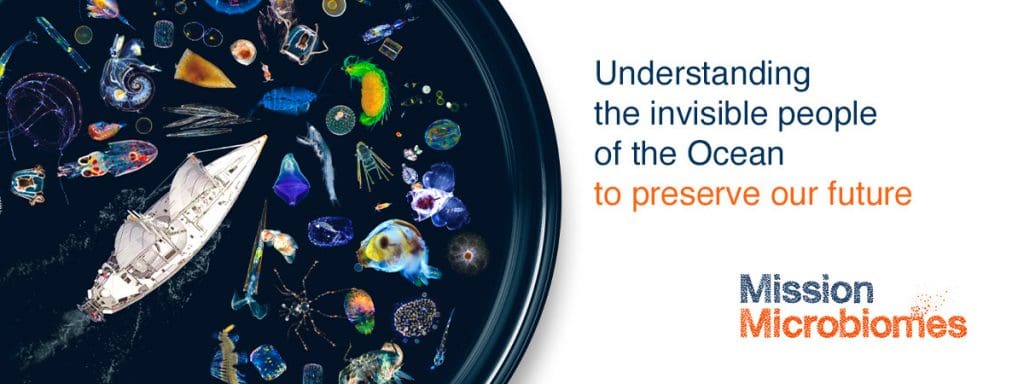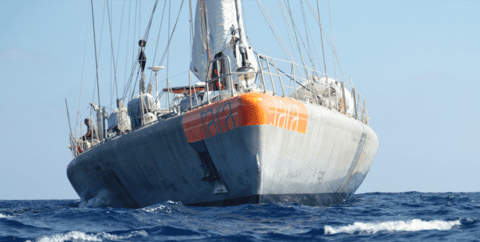Mission Microbiomes: the new expedition of the Tara Ocean Foundation

On December 12, 2020, five years after the adoption of the Paris Agreement, the schooner Tara will set sail from Lorient, her home port, to embark on a new major scientific expedition. Over nearly two years, the sailing laboratory will travel 70,000 kilometers in the South Atlantic, along the South American and African coasts and as far as Antarctica. Conceived by the Tara Ocean Foundation and its scientific partners including the CNRS, CEA, SZN and EMBL, this mission involves 42 research institutions from around the world.
We will study the ocean’s most fundamental fabric — the microbiome — to understand the functioning of this ecosystem in a context of ongoing global change.

Microorganisms play an essential role in the ocean, representing more than two thirds of the marine biomass. They are the first link in a huge food web that feeds much of humanity, and provides vital ecological & economic services. Microscopic organisms capture atmospheric carbon dioxide on a planetary scale and in return produce oxygen that we breathe every day. An essential cog in the great climate machine, the functioning of this invisible world remains largely unknown to date.
By definition, the ocean microbiome refers to all marine microorganisms (viruses, bacteria, microalgae, protists, etc.), but also their interactions with the environment. “It’s like a complete living being,” says Romain Troublé, CEO of the Tara Ocean Foundation. “It goes beyond a simple description of the microorganisms present. We want to understand how this microbiome functions as a whole — whether its effectiveness is sensitive to plastic pollution or to the ongoing warming of the ocean.”
Aboard Tara, scientists will collect the marine microbiome for a major DNA sequencing and imaging effort, while measuring a large number of environmental parameters, including temperature, oxygen level, presence of nutrients, and plastic pollution. “The colossal amount of data generated by this new mission will be archived and openly shared with the scientific community, contributing to planetary efforts to analyze and model marine ecosystems”, explains Stéphane Pesant, curator at EMBL-EBI and operations coordinator of the mission.
“Unlike previous Tara missions, which carried out uniform sampling wherever the boat went to reveal ‘Who is there?’, this time we will adapt protocols during the mission to understand ‘How does it work?’ “ , emphasizes Colomban de Vargas, CNRS / Sorbonne researcher and scientific co-director of the mission. With nearly 200 scientists involved via the Tara-GOSEE research federation and the AtlantECO program funded by the European Union, the team will be interested in the mechanisms and responses of the microbiome within the context of major phenomena (fertilization of the oceans by rivers and icebergs; microplastic pollution), and also in the expanding oxygen-deprived water masses, as found off Chile’s coast.
More generally, this new mission will provide a more detailed understanding of the major mechanisms linking the microbiome and climate. According to Daniele Iudicone, senior research at the Stazione Zoologica di Napoli, coordinator of the AtlantECO project and co-director of the mission, “The vast majority of the questions we will be addressing are related to climate change and pollution, and how the ocean microbiome will react and evolve. The responses provided by this mission should therefore prove particularly useful for improving climate forecasting models, in particular by integrating biological parameters.”
Beyond the scientific issues, the Tara Ocean Foundation will continue its awareness-raising mission by inviting the public and school classes on board in order to improve the general understanding of the Ocean and the challenges that exist in protecting it. During some of the 23 planned stopovers, the scientific teams will share knowledge with local researchers on know-how, best practices and techniques needed to study the ocean, from collection of samples, management and analysis of data, to the use of results in practice.
Throughout the mission, the public will be able to follow the human and scientific adventure on the Foundation’s and AtlantECO’s digital platforms, encounter different countries and discover marine microbiome research.
Moreover, together with AtlantECO’s partners, educational, ocean literacy, capacity building and events with decision makers and end-users will be organized at stopovers on the three continents visited (Europe, South America and Africa) to foster an engagement with and from everyone involved in the preservation of ocean resources, from citizens, scientists, to service providers and policy makers.
Given current health restrictions, the public will not be allowed to assemble and follow the departure of the schooner from Lorient, but a LIVE streaming of the event will be offered on Facebook and Instagram.





